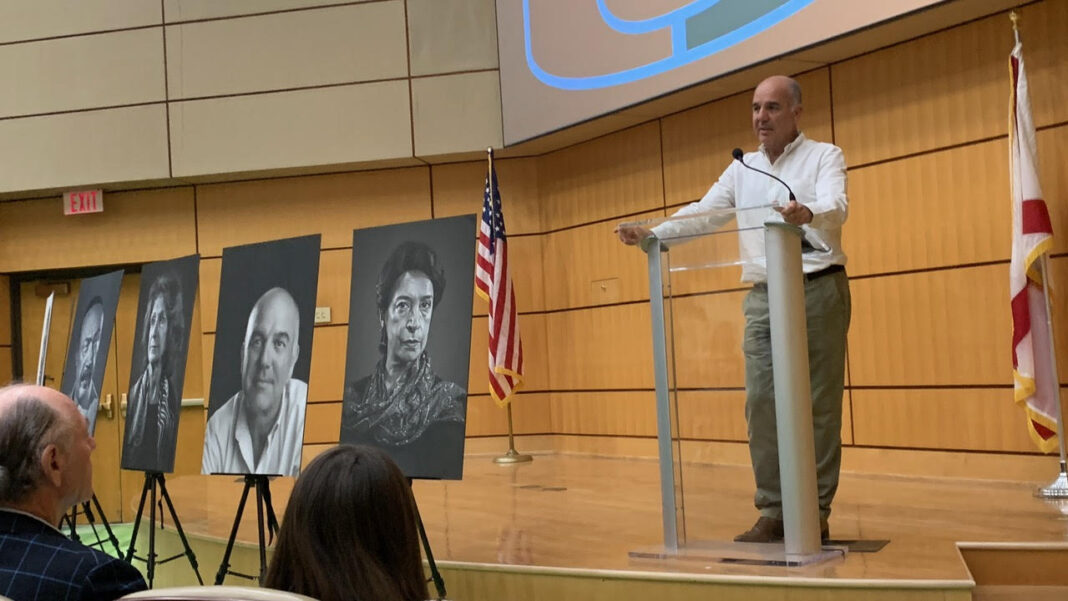
Through Sephardi Voices, an international NGO founded by Dr. Henry Green, a professor of Religious and Judaic Studies at UM, students were afforded the opportunity to learn about the plight of the Jews displaced from Arab lands.
Every November 30th, Sephardi Jews, Jews from Arab lands gather to observe Yom Plitim, a day to commemorate the expulsion of Jews from Arab lands in the 20th century.
Several notable speakers were in attendance, including Dean Ryan Holmes, Rabbi Jason Cook, Betty Srour, the Vice President of Engagement at UM Hillel, and Moroccan Jew, Jimmy Benaudis, each one contributing greatly to the event.
Junior media management major Eli Weiss is the president of Hillel, the center for Jewish Student life at UM.
“It was a great event to hear the stories of Sephardi Jews. For students who are Sephardi, it allows them to be seen and invites others to learn,” Weiss said.
For an immersive experience, students were offered traditional Sephardi foods, such as bourekas, a savory pastry, much like a pastelito, kibbeh, fried bulgur wheat traditionally filled with meat, and baklava, a dessert that consists of layers of phyllo dough, honey, and pistachios.
“I thought the event was important for students, whether they are Sephardi or not to attend. As someone of both Sephardi and Ashkenazi backgrounds, it is imperative that the voices of my ancestors are honored through events, such as these,” senior international studies majorJesse Fromer said.Inspired by his passion for human rights, Dr. Green created Sephardi Voices, an organization comparable to Steven Spielberg’s USC Shoah (Holocaust) Foundation.
“What is interesting about Spielberg is that he collected about 52,000 interviews of Holocaust survivors and yet, only 100 of the Sephardi. Italy controlled Libya, they were sent to concentration camps in Europe. Morocco, Tunisia, Algeria were under the Vichy government” Dr. Green said.
Dean Ryan Holmes spoke on the limited information of Yom Plitim and the relevance of Sephadi Voices in history.
“When I looked for information, only 15 entries surfaced, as Google stated that all of the entries were too similar to be displayed,” Holmes said.“While we have the limited power to fix our world as a whole, we have more of an ability to do our part here at the U.”
Jimmy Benaudis, a Moroccan Jew, whose daughter worked for Sephardi Voices, shared his story with the audience.
Although Benaudis and his family lived well in Morocco, he faced antisemitism as a young child and was taught to believe that it was part of life.
“I left Morocco in 1978, I left France in 2002, because antisemitism was starting to pick up in France and I didn’t want my kids to grow up in an antisemitic environment. And now, I don’t know what to think,” Benaudis said.
Betty Srour, whose grandfather fled Lebanon at eight years old to Brazil and eventually moved to Israel, joined the Israel Defense Forces, where he met her grandmother. “Three generations, three different homelands,” Srour said. “Today, I am lucky and privileged to say that I go to the University of Miami, a campus that is so diverse and celebrates each of our differences.”
Srour’s planning of this event marks the first time that Yom Plitim at the University of Miami was spearheaded by a student.
“I didn’t really know what to expect from the event, but I learned so much and would love to learn more about the Sephardic Jews and their stories,” freshman nursing major Alanna Miller said.
If you would like to learn more about Sephardi Jews, Dr. Green is teaching REL 409: Special Projects Religious Issues this coming semester on Mondays from 2:30-5:00 pm. If this conflicts with your schedule, his book, Sepahrdi Voices is a way to learn more.






